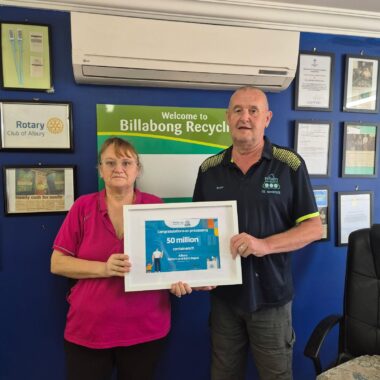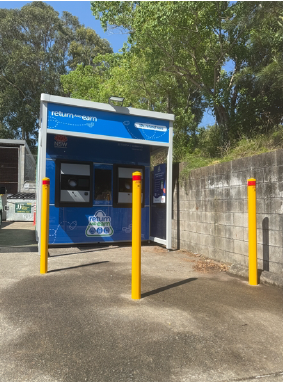MEDIA RELEASE
Three-quarters marine litter plastic, despite ban successes (World Ocean Day Down Under)
Wednesday 24 January 2023.
NATIONAL MEDIA EVENT: 9.15AM Wednesday 24 January 2023, Brisbane (Nudgee Beach Ramp Reserve), QLD
It’s official – plastic was responsible for over three quarters of litter collected from the nation’s urban waterways and catchments the past three years, even despite banned single use items like bags, straws and utensils now making up a fraction of it, new research released on the inaugural World Ocean Day Down Under reveals.
However, in some good news, Australians can register (SeaToSource - Conservation Volunteers Australia) for a trial of new data collection technology could help cut down plastic usage at the source, as well as the amount ending up in the sea, while also helping monitor the success of new consumer packaging design standards agreed by Federal and state governments in November.
This is according to Conservation Volunteers Australia, today launched the inaugural World Ocean Day Down Under as part of a national campaign of action through to international Word Ocean Day on June 8th.
Key Findings
Overall, analysis of CVA’s official SeaToSource data sharing partnership with the CSIRO found plastic made up 79% of litter collected nationally between 2020 and 2023, with plastic food wrappers (12%), polystyrene (9%), plastic bottles caps (5%), and “unidentifiable” shards of hard (13%) and soft (12%) plastic responsible for the majority.
The large proportion of cigarette butts (9%) – classified as a plastic - remains a major concern, particularly with restrictions on public sale of vaping devices risking a return to higher cigarette sales – and litter – in 2024.
In contrast, traditional ‘problematic’ single-use plastics, such as thin plastic bags, straws, plates and utensils, collectively made up less than 10% of all litter counted in line with recent phase outs across the country.
Sydney had the highest concentration of plastics nationally the past three year at 91% across key ocean-tributaries (including the Parramatta and Georges’ Rivers), while Perth’s Swan River was lowest at 61%.
CVA’s findings are based on nearly 400,000 pieces of plastic data collected between 2020 and 2023 by over 16,000 Australians, 150 community groups and 50 companies from 9 of the nation’s major urban waterways and catchments feeding into the Great Barrier and Southern Reefs stretching from Queensland to Western Australia.
|
Table 1: National & state percentage of plastic in marine litter |
|||||||
|
National |
Sydney |
Melbourne |
Brisbane |
Adelaide |
Perth |
Tasmania |
Nth Qld |
|
79% |
91% |
70% |
80% |
86% |
61% |
73% |
85% |
Quotes
Conservation Volunteers Australia CEO Phil Harrison said the increasing rates of plastic turning up in the nation’s riverbanks, bays and beaches meant greater at-home interventions were needed to help consumers cut waste off at the source before reaching the sea.
Mr Harrison said this combined with creating World Ocean Day Down Under (WODD), served as a timely focal point during the Australian summer to inspire communities, businesses, and all levels of government to share simple, yet powerful, ways to undertake sustainable, ocean conservation focused activities.
“Today’s launch is not about a single event, but about a season of action to address the urgent challenges facing our waterways, seas and oceans.”
“87% of Australians live close to the ocean or to the rivers and wetlands that are integral to the health of Australia’s communities and coasts.”
“80% of the plastics that plague the ocean originate in rivers, creeks and storm water systems, and World Ocean Day Down Under is a day that Australians can start or continue to take simple actions that improve the health of the ocean and create a stable climate.”
“The severe weather events we have seen across the country this summer have only exacerbated the pressures on our marine environments that are so vital to not just the natural world, but to the health, wellbeing and economic sustainability of all of our communities.”
“We are working hand in hand to support young people to play an active role in World Ocean Day, including by leading events and activities in their communities to inspire environmental change.”
Sophia Skarparis, also known as PlasticFreeSophia has joined with CVA to support our season of action, and is calling on Australian Governments at all levels to take action to protect oceans and waterways seriously.
“Generation Z is growing up in a time when the impacts of climate change and plastic pollution are becoming more pronounced, with initiates such as World Ocean Day Downunder and CVA’s Sea2Source there is hope for a resilient future.”
“Gen Z message is clear: Let's build a future where the ease of living aligns with the health of our planet, not its destruction”.
CVA and World Ocean Day are launching several initiatives over the coming weeks and months aimed at reducing plastic pollution and enhancing water ecosystems.
CVA is calling on communities, business and Government to support our World Ocean Day Downunder campaign.
For all Australians passionate about the future of the ocean, this partnership promises a brighter, more sustainable future for marine ecosystems. To learn more about World Ocean Day Down Under and to get involved in planned events, visit www.seathechange.org.au
Media Contact
Troy Bilsborough, [email protected], 0427 063 150
About us:
COMPANY BIO: Conservation Volunteers Australia has been the nation’s leading nature volunteer representative organisation for everyday Australians the past 40 years. CVA’s core purpose is to reconnect Australians with nature through meaningful volunteering in urban and regional centres across the country, while making real contributions to national conservation efforts, enhancing the physical and mental well-being of communities, and promoting practical connections to our unique natural heritage.
CEO HEADSHOT: Phil Harrison, CEO, Conservation Volunteers Australia https://tinyurl.com/yuh55ysy -



